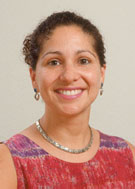|
|
|
Back
| Biography |

|
|
Dr. María Luisa
Zúñiga is an epidemiologist and Faculty member in the Department of
Family & Preventive Medicine at the UCSD School of Medicine. Dr.
Zúñiga has earned a national reputation as a researcher specializing
in barriers to health care and health care utilization practices among Latino
populations living with human immunodeficiency virus (HIV), particularly those
living in the U.S.-Mexico border region. Areas of expertise include HIV-related
stigma; language and culture-mediated barriers to care; binational health care
access; and inequities in care access, including disparities in HIV clinical
research participation.
Dr. Zúñiga has developed opportunities to expand
her research collaborations in the field of global health and HIV. Dr.
Zúñiga serves as a core faculty member in the USAID-funded
"Cross-Border HIV/AIDS Prevention Training Program in Northwest Mexico Border
Region" (Project TIES) where she has collaborated with research colleagues
from the US and México to develop and teach – in Spanish –
an epidemiology/public health module for cross-border training of health
professionals in HIV/AIDS and Tuberculosis. Through this and additional
collaborations, Dr. Zúñiga has forged collegial relationships
with HIV/AIDS researchers on both sides of the U.S.-Mexico border.
Examples of these collegial relationships include the opportunity to network
with scientists from other National Institutes of Health (NIH) funded research
projects in HIV border health and an opportunity to work with researchers on a
National Institutes of Drug Abuse (NIDA) study of the epidemiology of HIV and
blood-born viruses among injection drug users in Tijuana, Baja California, Mexico.
Dr. Zúñiga's National Institutes of Health (NIH),
National Center on Minority Health & Health Disparities (NCMHD),
Comprehensive Research Center in Health Disparities (CRCHD) funded pilot project
is described below.
|
See Also: Selected Publications
Pilot Research
Dr. Zúñiga's study was developed in response to the disproportionately low number of persons
of color enrolled in HIV/AIDS clinical research studies and the disproportionately higher
number of new AIDS cases among Latinos. Dr. Zúñiga's study had five specific aims to assess:
- HIV+ Latino patient knowledge about and perception of access to HIV/AIDS clinical trials,
- HIV Primary Care Provider confidence in identifying HIV/AIDS related health issues
confidence in ability to appropriately refer patients to HIV research trials, and
knowledge of where to refer patients for enrollment in clinical trials,
- HIV Primary Care Provider perceived consistency in decision criteria for referral of
patients to research studies,
- HIV/AIDS Case Manager potential role as a venue for promoting patients to ask about
clinical trial participation, and
- HIV Research Recruiter perception of barriers and facilitators to Latino patient
enrollment in clinical trials.
40 Latina women were recruited from three clinics within San Diego County. Each woman answered 29
closed and open-ended questions from a survey that was administered in their preferred language
(Spanish or English). With the results from this instrument, the research team categorized
themes and coded the qualitative data. Interviews of 40 HIV+ Latinas and 14 HIV
service providers were carried out. The study found that "respondents' perceived barriers
[for participation in clinical studies were]: fear of participation (32%), lack of
information (18%), and denial of illness (13%)." From the data and results from this
Pilot Study, Dr. Zúñiga applied and received a K01 award, the five-year Scientist
Development Award for New Minority Faculty from the National Institutes of Mental Health.
Her new NIMH study is entitled "Behavior & Clinical Trials Participation in
HIV+ Latinos.
[ Top ]
|
|
|
|
|
